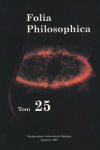Otfrieda Höffego koncepcja państwa sprawiedliwego
An Otfried Hoffe’s conception of a just state
Author(s): Zdzisław KieliszekSubject(s): Philosophy
Published by: Wydawnictwo Uniwersytetu Śląskiego
Keywords: Otfried Hoffe; conception of a just state
Summary/Abstract: In this article, I present Höffe’s analyses, the most important consequence of which is his claim that the best form of a just state at the present civilisational stage is a democratic state of law. Before Höffe makes a claim like that, he places his considerations in a historical-philosophical context of a discussion on the theory of a just state (Plato’s, Aristotles’, Hobbes’ and Kant’s conceptions, and ideas of a political-legal positivism are quoted), as well as contemporary controversies evoked by the necessity of the existence of state as such (anarchism is cited at this point). It is necessary to present this context because it makes it easier to understand the way leading Höffe to the acceptance of a democratic state of law as a just system. The first part of the article is devoted to this issue. In the second part, I explain the most important anthropological-ethical fundaments on which Höffe bases his theory of a just state. Among them, the most significant seems to be an indication that man is a rational and combative creature by nature, and it is only the theory of a just exchange that helps to justify an obligatory character of basic human rights (Höffe calls them “basic human interests”). The third part shows the way Höffe authorizes the necessity of the existence of the state as such, as well as search for a certain form of a just state, which ends with the perception of a democratic state of law as a just system.
Journal: Folia Philosophica
- Issue Year: 2007
- Issue No: 25
- Page Range: 246-271
- Page Count: 26
- Language: Polish

